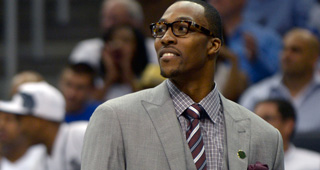As Dwight Howard forged a path to Los Angeles, front offices across the NBA wanted so badly to edge the Lakers and get involved as a potential landing spot. Understandably so, with the league’s best center – a top MVP candidate on a yearly basis and a future Hall of Famer – on the open trade market. But throughout this nine-month saga, one aspect became clear to many teams in the hunt: The chase for Howard will be a futile endeavor, because he has no interest in coming aboard.
For almost a year now, the Chicago Bulls made it evident that they would remain in dialogue with the Orlando Magic until the end. Yet they, and most recently the Houston Rockets, found out sure enough that Howard was angling himself elsewhere – while Atlanta Hawks general manager Danny Ferry told the Atlanta Journal Constitution last week that the Magic “were apprehensive to trade [Howard] within the division.”
These days in the NBA, a star’s ability to forge his way from one team to another has vastly elevated, bourn out of LeBron James’ decision to join the Miami Heat two years ago. And, ultimately, Howard was the latest to make good on his wish list of three, the Brooklyn Nets, Lakers or Dallas Mavericks.
Despite the allure of the Bulls’ franchise, the third-largest market in the country and the possibility of playing with Derrick Rose, Howard never wanted to come to Chicago. For all he talked about his first priority being winning, Howard never wanted to be sidekick to Rose, who fully surpassed him as adidas’ most popular and productive pitchman.
Growing his brand has seemingly been at the top of Howard’s agenda, a goal for many professional athletes but one the greats have always managed to balance with winning. James took a public beating in the eyes of many observers after his choice to leave the Cleveland Cavaliers, but winning was his first desire throughout the process as he all but ignored the lure of New York.
Howard, on the other hand, cited non-basketball reasons not to join the Bulls, claiming he didn’t want to head to Chicago’s cold-weather climate, and yet he still had Brooklyn atop his wish list. Instead, from day one he hoped to go somewhere he’d be the man – win or lose, as his top choice of the Nets would suggest. adidas also reportedly had a role in steering Howard away from the Bulls, with its face of the company already saturating Chicago’s market.
Still, in some circles the Bulls’ talks with the Magic have largely been overplayed recently. Both parties haven’t been linked to each other throughout the summer. Truth be told, Chicago’s presence had been nonexistent in trade discussions surrounding Howard up to his final moments as a Magic, people with knowledge of the Bulls’ thinking say.
While the Bulls would have held Howard’s Bird rights had they acquired him, there was no inclination that he had any plans to sign a long-term contract with them next summer. Yes, the Bulls had established players such as Luol Deng, Joakim Noah and Carlos Boozer to offer, but clearly that type of package was the furthest one from Magic general manager Rob Hennigan’s mind.
In hopes of rebuilding through the draft to go along with financial flexibility, the Magic eventually received picks, cap relief and filler in the blockbuster four-team trade. Even so, the 24-year-old Andrew Bynum would have given them the piece to build around while still trying to strike in the draft. As fond of Arron Afflalo as those within the league are, he isn’t a star the Magic will center their team around.
The Bulls still could have easily stuck a strong hand forward in the race for Howard that demanded patience. Would their best package of young assets – promising forward Taj Gibson, heralded commodity Nikola Mirotic and future draft selections highlighted by the Charlotte Bobcats’ valuable protected future first-round pick, as well as potentially another team jumping in to supply further picks – have trumped the one Orlando ultimately received?
Nevertheless, Howard and his camp long made known that he had no desire to play second-fiddle to Rose, no pull toward a city where he believed his brand would not prosper, but stagnate. His agent, Dan Fegan, had asked for and was granted permission last December to consult with the Nets, Lakers and Mavs about Howard – never requesting it for the Bulls.
“Sometimes, at least what you hear from agents, it doesn’t have anything to do with basketball,” Bulls vice president of basketball operations John Paxson admitted to a local radio station last December. “It has more to do with marketing and whatnot. Those are the things you don’t have under control, when an agent gets involved and doesn’t even want to talk to you. All you do is keep trying, and we certainly will.”
Indeed, the Bulls tried repeatedly over the past nine months, but nothing changed. Clearly, their fortitude dwindled as Howard neared his final months with the Magic. Yet in these recent episodes of stars paving the way to their desired team, organizations like Chicago and Houston found the chase for Howard a lost cause, an inevitable outcome within sight.



